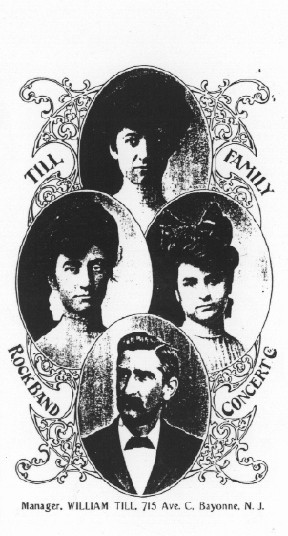
Last updated: 2 May 2007

Lithophones (instruments made from ringing stones) must date back to the Palaeolithic era. Probably the last professional group to use them was from late 19th-century America: the Till Family Rock Band. I have put together some materials I got from the pipemaker Julian Goodacre; he got most of it from the Metropolitan Museum of Art in New York, which still has the instruments in storage.
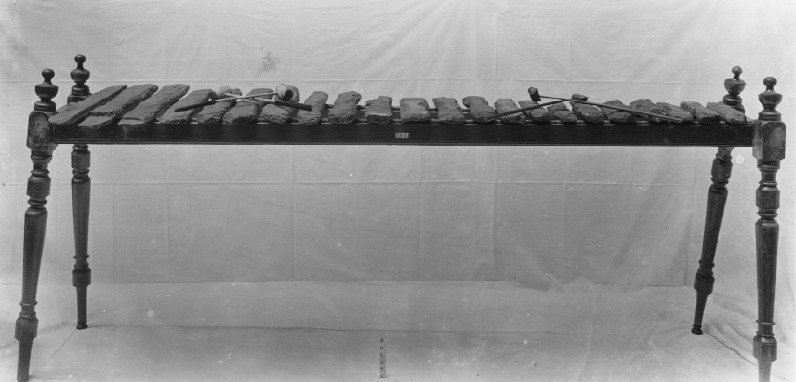
A letter to Mrs. J. Crosby Brown dated Nov. 20 1903 from William Till (The Rock Band Concert Company, 715 Avenue C, Bayonne, N.J.) includes a note about the origins of the rocks:
These Musical Stones were gathered from the Cumberland Mountains of England by Mr. William Till, now residing in Bayonne, N.J. Mr. Till for many years explored the Palaeozoic rocks of the Cumberland Mountains and at length found a series, which, when struck, produce musical sounds. The Rocks are Gneiss and Hornblende Schist. Mr. Till commenced to collect these stones by way of amusement, and by the end of the year he had gathered enough to form an instrument of an octave and a half on which simple airs could be played. The idea of a perfect instrument followed as a natural sequence. Mr. William Till assisted by his father continued to work on it and devoted many years in completing the instrument, which is now in the possession of Mr. Till.
John Ruskin took great interest in this instrument and it was mainly due to his encouragement and interest that the Till Family were induced to exhibit publicly it's wonderful musical qualities.
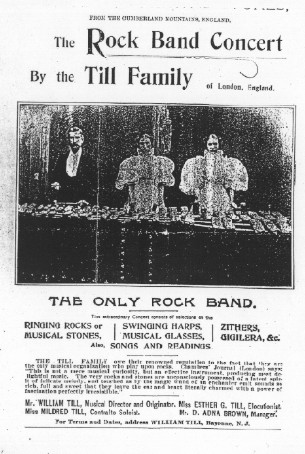
A concert bill includes these notes:
"Mr. Till has for many years been exploring the palaeozoic rocks of the Cumberland Mountains, England, and has at length found a series of rocks which, when struck, give sounds as various and more accurate than the chords of a grand piano. The Rocks are Gneiss and Hornblende, and were deposited prior to the introduction of life on earth, probably 100 million years ago. Mr. Till commenced to collect these stones by way of amusement, and by the end of the year he had gathered enough to form an instrument of an octave and a half on which simple airs could be played. The idea of a perfect instrument followed as a natural sequence. Mr. William Till and his father, Mr. Daniel Till, continued to work on it and devoted eleven years in bringing the instrument to its present complete form. The stones are from six inches to four feet long, arranged on a frame 12 feet long. It has a scale of five octaves."
MR. WILLIAM TILL, the originator of the Rock Band, received his musical education in England, studying the organ, violin and piano. He has directed all the Rock Band Concerts, over three thousand, commencing at Crystal Palace, London, Eng., and after a tour in Europe came out to this country through the influence of the Rev. Dr. F.E. Clark, of Christian Endeavour renown. After visiting all the principal towns and cities the family retired from active concert work and confined their concerts to Greater New York only, where they have given 300 concerts. Mr. Till was engaged as organist and choirmaster of the First Reformed Church and musical director of the Bayonne Musical Society. At the last concert under his leadership Handel's great oratorio, The Messiah, was rendered with large chorus, orchestra and distinguished soloists. As many requests have been received from all parts of the country to give his remarkable Rock Concerts, the present tour has been arranged, which will positively be the last. Mr. Till will be ably assisted by his two talented daughters.
MISS MILDRED TILL as a vocalist possesses a rich contralto voice, deep and full, thoroughly trained and under full control. Her selections are always received with the most enthusiastic applause. Miss Till is now studying with the well-known teacher, Madame Murio Celli. As an instrumentalist she is a brilliant pianist, also an accomplished organist, and has studied with Victor Baier, the organist of Trinity Church, New York.
MISS ESTHER G. TILL, the young and gifted elocutionist, has appeared with great success at concerts in New York and Brooklyn; her selections, especially the humorous, are very popular. She is also a clever instrumentalist and joins the family in all the concerted pieces on the Rocks, Glasses, Swinging Harps, etc.
THE TILL FAMILY CONCERT. - The most surprising and pleasing musical entertainment of the year was heard last night in Library Hall. The Till family play as sweetly as can be imagined. Professors and students from Cornell University vied with blacksmiths and carpenters from the city workshops (of course the ladies were all proud and delighted, too) in the volume and warmth of applause for every number. Music in the rocks and glasses, in the swinging harps and zither - purest, sweetest, most astonishing of music. Old musical critics and young professors of music laid aside their reserve and gave vent to their delight and surprise. To tell the truth, we did not expect such music. Ithaca did not believe the strong praise that preceded this family. The sweetest music in the world is in the rocks and glasses that we heard last night. The selections were very popular and the artistic side of the entertainment was high. The singing of Miss Mildred was exquisite, while the recitals of Miss Esther were simply charming. The grace and modesty of the young ladies were captivating. A return date to Ithaca will again pack the hall with our best musical and intellectual people. - Ithaca, N.Y., Daily News.
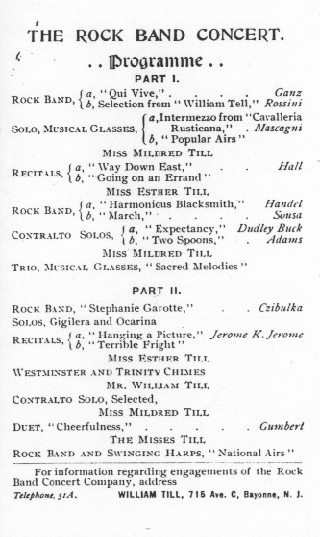
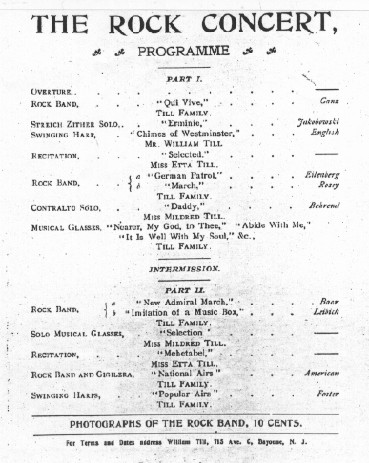
The concert bills also mention "swinging harps". A picture suggests they played something like a handheld aeolian harp actuated by waving it about.
The only published musicological article about the band seems to be A.M. Till, "The Till Family Rock Band", Galpin Society Journal, number XLII, August 1989, p.121.

There is a similar instrument at the museum in Keswick in the Lake District: http://www.visitcumbria.com/kes/kesart.htm.
If anybody wants to make one and has a van or large car and a few days to collect rocks, I know of a good source of lithophonic schist in the Scottish Highlands. But it's at the top of a mountain, half a day's walk from the nearest road.